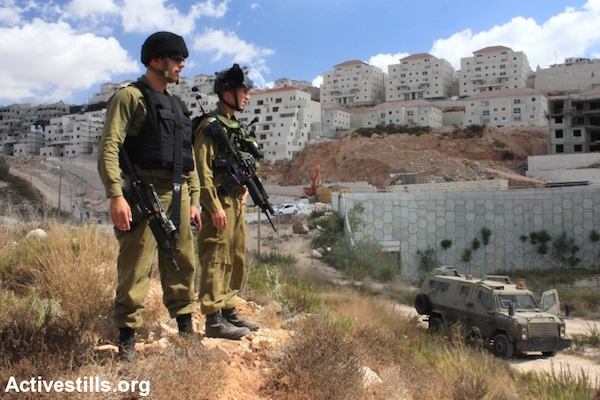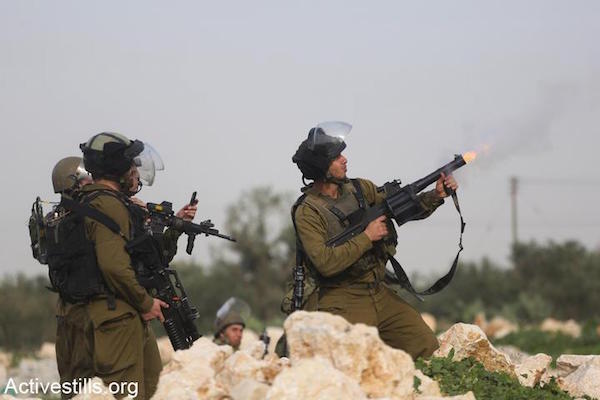Why does the the IDF indict soldiers far more often for property-related crimes, while closing cases in which soldiers are suspected of wounding or killing Palestinians?
By Yossi Gurvitz, written for Yesh Din

In 2014, a total of 15 Israeli soldiers were indicted for harming Palestinians, as can be seen by our latest data sheet regarding law enforcement on IDF soldiers in the territories. Eight of those indictment were the result of investigations that began in 2014; seven as a result of older investigations. Of all investigations opened last year, only 3.5 percent ended indictments.
Israeli police, as is well known, aren’t the sharpest tools in the shed. Our earlier data sheets reveal how they regularly fail to investigate crimes against Palestinians. And yet, the IDF managed to reach an indictment rate double that of Military Police Criminal Investigations Division (MPCID): seven percent or more.
What more, when the Samaria and Judea Police Division closes a cases, it will do so — in most cases — under the “Unknown Perpetrator” clause. It will claim not to have the faintest idea as to who may be the suspect. Unfortunately for MPCID, its ability to use this clause is almost nonexistent. The IDF knows, or at least can know, where every one of its soldiers was at any given time. If the criminal is described as being a part of a force acting in village X on day Y, MPCID can find out all the details. It may still not obtain enough evidence against a specific soldier, but it generally crosses the main obstacle of an inability to identify suspects quite easily.
Yet it succeeds less than the Samaria and Judea Police Department. So what’s going on?
Looking at the cases that did make it to court provide us with a partial answer. In 2014, as noted in our data sheet, MPCID opened 229 investigations relating to soldiers who harmed Palestinians. 41 cases, around 18 percent, dealt with the killing of Palestinians by IDF soldiers; 154 cases, around 67 percent, dealt with violence against Palestinians; 20 cases (9 percent) were opened on suspicion of looting; and 14 investigations dealt with suspicion of conduct unbecoming.
Out of these 229 investigations, only eight of them ended in indictments. But when one looks at the indictments themselves, an interesting phenomenon becomes clear: even though most of the investigations were opened over cases of killing or wounding/assault, nine of the 15 indictments (some 66 percent) dealt with property-related crimes. In other words, theft.
Some of them were of low value. One soldier was indicted after looting a car in a roadblock, taking two car flashlights, a set of LED bulbs and a flickering flashlight. Another soldier was indicted for passing Palestinian cars through a roadblock for a bribe of some 200 NIS per vehicle.
Two caveats are in order. Firstly, due to the slow pace of the military investigation apparatus (about which you can read more fully here), it is quite possible that some of the 2014 investigations may turn into indictments in 2015 or 2016. Also, in MPCID’s defense we must note that property crime leaves solid evidence, which it may then seize as part of the investigation. And yet, the gap is astonishing. Why does the IDF systemically fail in investigating incidents of soldiers who physically harm Palestinians? And why does the IDF indict soldiers far more often for property-related crimes, while closing cases in which soldiers are suspected of wounding or killing Palestinians?

Here we must carefully move from measured data to conjecture, as we are not likely to get a straight answer, particularly not from the IDF.
It is quite clear there is no military order from on high that calls to neglect such incidents, nor is such an order needed. Every soldier knows full well the spirit of command. Why is MPCID so bad at investigating physical harm against Palestinians? To quote an old IDF saying, “there is no ‘can’t,’ there’s only ‘won’t.’” There are issues that are of the utmost importance to the army. Discipline, for instance. Looting is a severe breach of discipline. A military unit that begins to believe looting is permitted is quickly reduced to a gang, and its effectiveness plummets. Corruption harms, by definition, the effectiveness of military activity: a situation where, for instance, a soldier allows someone to pass through a checkpoint for the equivalent of six packs of cigarettes is unacceptable. The soldier, after all, does not know who he is letting through.
So these are the severe cases, those which draw full attention, which every investigator knows he has to treat seriously: offenses that harm military effectiveness. For instance, no less than 40 percent of MPCID’s investigations are drug-related, and 83 percent of these deal with personal drug use (Hebrew).
Other issues, such as physically harming a Palestinian or opening fire in questionable circumstances, are of lesser importance. However it may sadden us, an army is an organization whose goal is the use of institutionalized violence. A soldier who kills someone has essentially done what he was trained to do, even if he, unfortunately, broke the rules of engagement. A dead Palestinian, to sum, does not threaten military effectiveness. A soldier who takes bribes for opening a checkpoint or is busy looting does constitute a threat.
And since the number of investigators is limited, and as they have a limited amount of time, naturally – without any need for an order or directive – their energy is channeled to the places the organization sees as important. Thus we find ourselves with a pyramid turned upside down: even though the number of cases of corruption and damage to property is relatively small, it is precisely these cases that lead to indictments.
This is yet another reason why we should consider taking the investigation of IDF soldiers who harm Palestinians out of the hands of the IDF. Because these cases require an investigation by people who consider harming an uninvolved person (or a disproportional harm of an involved person) to be a grave crime — a crime in itself, not merely a hassle on the way to the next looting or drug case. We need people whose goal is first seeing justice, and only then the needs of the military.
Written by Yossi Gurvitz in his capacity as a blogger for Yesh Din, Volunteers for Human Rights. A version of this post was first published on Yesh Din’s blog.

